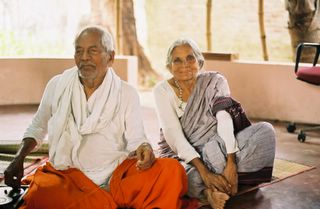Kuthur from Aliyah
This morning I went to many of the fishing villages in Nagai district damaged by the tsunami. We (my dad, Krishnammal, Veerasami, Natarajan - the LAFTI recorder and photographer, and I) left at seven in the morning. Krishnammal later confided to us that our early start was due to some other visitors here to do relief, who would rather talk to us than work. I have gotten fairly used to going to bed at 9:30 and waking up before 6, a schedule I would never keep at home.
Most of the villages (we visited at least five) have melded together in my memory. All were severely damaged in the tsunami. The sight of boats strewn about like sticks and crushed houses has become familiar. We saw one dumped unceremoniously by the big wave three miles from the coast. At many of the villages, the people were not actually living at the site, which was uninhabitable, but at camps farther from the shore. Relief agencies often simply dump supplies, without asking what is needed. At several villages, there were huge piles of disorganized donated clothing strewn on the ground where it had been left, the brilliant colors contrasted with the desolate, unvegetated soil. In the distance is the white spires of the Vailankanni church, gleaming like a wedding cake, which sits on the spot on which Portuguese sailors were shipwrecked in the 16th Century. These people have no houses in which to keep or cook food, nor do they have water for laundry.
The stories of the villagers have also become familiar. One man lost his wife and child, another’s brother was killed. One woman had lost her three children, and simply sits in the camp all day, refusing to eat. Krishnammal listens to all of these stories. The people all know her and Jagannathanji from their work on the prawn issue, especially from Jagannathan’s 58-day fast at Nagapattinam to protest what the destruction of mangroves and estuaries had done to the breeding habitat for the fish, upon which the fisherfolk depend. “What these people need most is a listening ear,” she says. She is planning a padayatra (consciousness-raising walk) along the coast, the purpose being to unite the fisherfolk and the farming communities in their continuing struggle against the prawn farms, and, as always on these walks, to listen to the people’s voices.
We pass several funerals along the road, as well as the body of a child being taken away. We also pass many prawn farms, their bleak gray-brown pools in stark relief among the lush green paddies, many close to harvest. Most of the prawn farms are out of operation from last month’s floods and tsunami, but Krishnammal does not know if they will start up again. The last village we visit was not, in fact, reached by the tsunami, though it was severely damaged by the floods, but it has perhaps the saddest story of all. Surrounded by prawn farms, unemployment is 100% in this village, which is surrounded by prawn farms that have made the land, once these people’s livelihood, uncultivatable. Brackish, polluted water seeps out of these prawn farms, located right against the village, and corrodes the houses. The villagers left their homes for a few days, fearing the tsunami would reach them. When they returned, some found all their goats and cattle gone. Relief organizations would not give them anything, because they had not been harmed by the tsunami, but by the floods! They want to move the village, but they have trouble finding land anywhere else. “Every year, at this time, they find themselves starving,” says Krishnammal. “I always send them some rice, but if they had any choice they wouldn’t accept it.”
Our ride back to Kuthur is quiet. Krishnammal falls asleep, and no wonder. I almost never see her sit down. She is always planning marches, overseeing workers, cooking food, and getting me to eat so much that I sometimes feel I will burst. At Kuthur, we have a large lunch (always the biggest meal) and go to take a nap. The green peacefulness of the LAFTI headquarters seems so far away from prawn farms and tsunamis, though it is less than six miles to the coast.
In the Light,
Aliyah


2 Comments:
Hello. I am reading your blog from afar and my heart aches for the devestation there and the lack of helpful assistance from the aid agencies. At the same time, my heart soars for the work you are doing and the comfort you are bringing. May you continue to find courage and hope from the lives you touch. I am one who can only give funds, not hands-on-help in response to this tragedy and I am greatful that while I continue to give funds, you are able to do the work on the ground. Thank you. Shalom, sa'lam, peace.
Aliyah, I read your post to my children, Unschoolers in Maryland, USA. They know some about the tragedy, though at 7, 6 and 4.5 they are sheltered from many images and the true impact of the tsunami. Your gentle words and visual descriptions have touched them deeply.
Emily (7) says, "My mom heard about the tsunami on the news, but I've only seen one picture of a woman coughing, working to help with the bodies. I am sad that people are hurt and in danger of disease."
Julia (6) says, "Thank you for posting. It's really sad. Maybe we will get to meet you sometime."
Thank you, Aliyah and David, for your words, time and generosity. We will continue to follow your journey and keep you and those you work for in our hearts.
--Danielle
Theatre du Monde
Post a Comment
<< Home